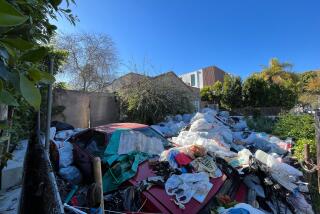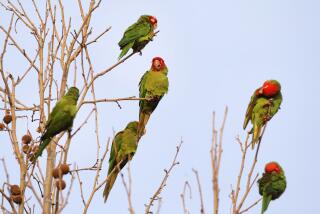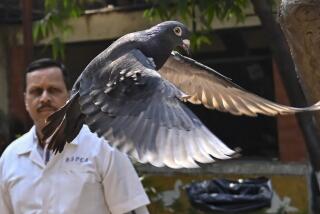Neighbors Say Birds Put Them to Flight : Racing Pigeons Develop a Spotty Reputation
- Share via
MANHATTAN BEACH — When Lucile Lewis throws a neighborhood block party in her backyard, she first looks cautiously toward the sky “in holy fear that the pigeons are going to fly.”
Margaret Reeves, who lives two doors away, says she has given up on backyard parties altogether. Droppings in her food and hair have transformed festive occasions into messy nightmares, she says.
The neighbors are two of about half a dozen homeowners on 27th Street who, for the second time in a decade, are venturing from beneath their porches and awnings to wage war on bird droppings.
The neighbors say dozens of pigeons that are kept in the backyard of Joseph Arrigo, an award-winning pigeon racer who lives on 26th Street, launch aerial attacks on the neighborhood at least twice a day. The damage, they say, is measured in spotted cars, blackened rooftops, splattered pavement and abandoned picnics.
City Intervention
The neighbors want the city to intervene--either by revoking Arrigo’s permit that allows him to raise pigeons or by requiring him to train the birds away from their homes. They say the pigeons are an unbearable nuisance.
“I walked out into my yard, felt this plop and went into the house and saw it in my hair,” said Reeves, 38, who has lived in the neighborhood for 14 years. “I can’t have family gatherings in my backyard any longer because I don’t know when the birds will be out.”
“This area is too congested for this type of hobby,” added Lewis, 68, who has lived on 27th Street with her husband since 1948. “It isn’t pleasant in a nice neighborhood like this.”
Arrigo, a soft-spoken engineer for the Metropolitan Water District, says his birds are getting a bad rap. When neighbors complained about his pigeons 10 years ago, he agreed to restrict flying to between 5 p.m. and 9 a.m. He says droppings in the neighborhood are not from his pigeons, but from wild birds who do their thing regardless of the time of day.
“As soon as they come back in the morning they eat and that is all they get for the day,” said Arrigo, 62. “By the time they get out in the late afternoon, all of the food is digested. Mrs. Reeves’ problem is the birds that eat all day long.”
30 Years in Neighborhood
Arrigo, who renewed his annual permit early this year, is no newcomer to the neighborhood. He and his family have lived in their two-story yellow and white home for more than 30 years. He has raised pigeons for more than 20 of those years and first raced pigeons as a high school student in Los Angeles.
Arrigo belongs to several local and national pigeon racing organizations and has received numerous trophies for his champion pigeons. He serves as president of the Southern California Racing Pigeon Combine, and in May his birds took first, second and third places in a 380-mile race from Woodland, Calif., a town near Sacramento, to his home.
The sleek and well-muscled pigeons, raised from birth to race, are trained to return home from wherever they have been released--sometimes as far as 600 miles from home. After the distances are calculated, winners typically are determined by the number of yards flown per minute.
Richard Reid, secretary of the Los Angeles chapter of the American Racing Pigeon Union, a national group with 13,000 members, said Arrigo is one of the top pigeon racers in the Los Angeles area, where there are an estimated 300 pigeon fanciers.
85 Pigeons
Arrigo has 85 pigeons in two lofts in his backyard. Every day before he leaves for work at 6:50 a.m., he releases 35 pigeons for their morning exercise. While the pigeons circle the neighborhood, Arrigo fills their troughs with food and water and sweeps out the cages. The birds usually return home for breakfast in about half an hour.
Shortly before 6 p.m., after returning home from work in downtown Los Angeles, Arrigo releases the birds again and refills their food and water troughs. Again, only 35 birds--those that are in training for upcoming races--are allowed to exercise. The others remain in their lofts all day.
While pigeon fanciers acknowledge that the racing birds occasionally release droppings from the sky, they insist that most of their food is digested and excreted in cages. They say pigeons are singled out for blame because they are easy targets.
“They blame it on the pigeons because they have no one else to blame,” said Charles Herin, secretary-treasurer of the American Racing Pigeon Union in Maineville, Ohio. “They don’t know where it is coming from. Everybody gets bird droppings on their car sometime.”
No Records
Herin said the group does not keep records of complaints about pigeon droppings because “we would have to move out of the house” to make room for file cabinets. He did say, however, that most complaints about pigeon droppings in fact involve other birds.
Racing pigeons, because they are fed grain in a controlled environment, have firmer and darker droppings than wild birds, which eat berries and insects all day long, he said.
“You have to know pigeon droppings,” he explained.
Reid, who keeps 200 pigeons at his home in Redondo Beach and has had some complaints from neighbors, said racing-pigeon droppings are dry because of the grain diet. “They aren’t the kind that stick to fences or houses,” he said.
But Reeves, who has kept a log of the Arrigo pigeons’ activity, says she is convinced that his birds are the source of the droppings. She said the problem has existed for 12 years and said she has seen his birds fly near her home between the restricted hours of 9 a.m. and 5 p.m.
Damaged Paint
Lewis said the west side of her house, which is in the pigeons’ flight path, is hit hardest by the droppings. She blames the pigeons for damaging the paint on that side of her house.
“A couple of years ago we spent money to have the house painted and the west side was spoiled before it even was dry,” said Lewis, adding that it would cost $450 to repair the damage. “Wild birds fly higher and they don’t hit the same spot all the time.”
Arrigo and his neighbors are not talking to each other, but they said in separate interviews that they would be willing to sit down and try to resolve the problem.
Reeves, Lewis and several other neighbors have written letters to the city asking that the City Council settle the dispute. The council this month ordered the board of zoning adjustments to hold a hearing in September to consider arguments that the permit should be revoked because the birds constitute a public nuisance.
Reach a Compromise
Arrigo said he hopes to get representatives from the California State Racing Pigeon Organization to step in and help him reach a compromise with his neighbors before the hearing. The organization regularly provides legal counsel to its members who run into problems with neighbors.
“I get pretty upset about it,” Arrigo said. “It is pretty traumatic. This is my main hobby. I have had pigeons since I was a kid in high school. These people just really don’t understand the situation and they make erroneous assumptions.”
But Reeves said neighbors have put up with the pigeons long enough and should take a stand.
“We have reached the point where we are tired of it,” she said. “We are not against him having his hobby. He can keep the pigeons in the backyard. We are complaining about the damage done to our property from his birds using our property as a toilet.”
More to Read
Sign up for Essential California
The most important California stories and recommendations in your inbox every morning.
You may occasionally receive promotional content from the Los Angeles Times.













